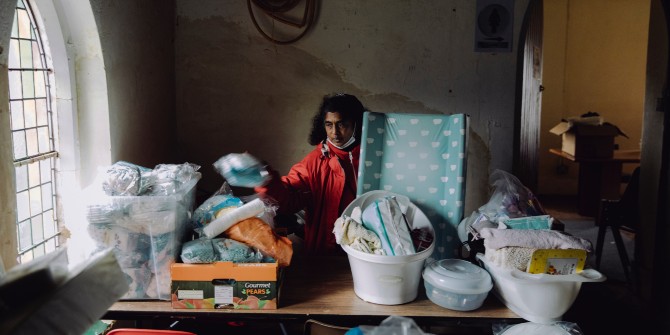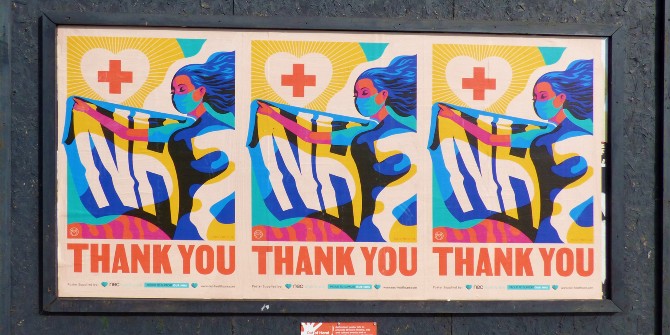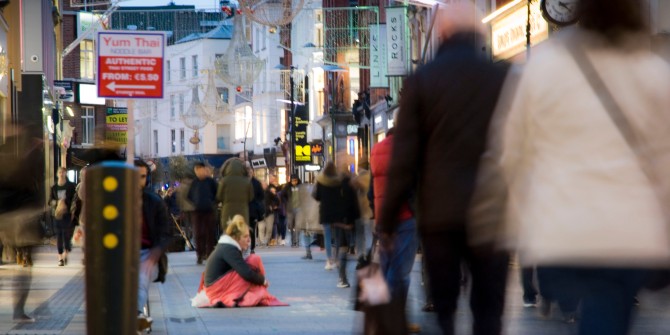Besides ‘the economy’ and ‘health’ lies a neglected area of human life during the pandemic: social infrastructures. These vital links, sustained by families and communities, now need to be a priority. The LSE COVID and Care Recovery Group call for both urgent and long term help for voluntary and community groups.
How can we keep people safe from the virus by restricting social interaction, while also providing support? This has been the key challenge of the pandemic for policy makers, the voluntary sector and communities. A year of ethnographic, participatory and quantitative research has revealed that people have fallen back on their families, neighbourhoods and communities in order to navigate this issue.
Imagine if these ties had not been there when nurseries, schools and universities closed in lockdown, or when young adults lost their jobs or elderly relatives needed help. Or if, as charities shut their doors, no mutual aid groups and voluntary sector organisations had stepped in to deliver food parcels or medicines, or to offer practical and mental health support. Without this work we would have no society left to rebuild, and the unwell and disadvantaged would have fared even worse. In the UK, these initiatives saved lives. When vaccines became available, the voluntary sector, religious organisations and community champions built on these relations of care to encourage uptake. They also helped people to grieve and recover from losses of life and livelihoods.
Yet while people have been able to appeal to policy-makers over the past year by talking about the importance of ‘the economy’ or ‘health’, they have often struggled to find a language to express a need for forms of care and relationships. ‘Mental health’ is one such category that has emerged to communicate unresolved problems. But the term ‘mental health’ often frames the issue in terms of an individual’s psychological state of mind. This can feed into a language of ‘personal responsibility’. Our research shows that many of the concerns people face are with forms of care and (dis)connection. Rather than a form of ‘personal responsibility’, this shows how relationships are at the core of people’s concerns, and how it is through relationships that we have sought to care for and protect one another.

We use the term “social infrastructures” for these networks of kinship, care, formal and informal support within and between families, friends and communities. The pandemic has made our dependence on them visible. Economic life and pandemic recovery could not — and will not — continue without them.
However, some groups have become more connected to social infrastructures of care, while others have become less connected or even excluded. This has had direct effects on inequality, health outcomes and cohesion. While local authorities (LAs), third sector, faith based and grassroots organisations have come together in new ways to meet the needs of families and communities, the barriers and opportunities for various groups to become part of these new networks are unequally distributed. The ways in which people relate to and care for each other has changed during the pandemic in the UK, and this has generated new forms of mutuality, burdens, stigma and mental health concerns.
As our new report Social Infrastructures for a Post-COVID World argues, these social infrastructures of care need to become a focus for recovery. During the past decade, there have been few attempts at holistic policy that builds these relationships, but this approach is now essential. In the long term, this can be achieved through:
- A Royal Commission on Social Infrastructures which could draw on the wealth of expertise across the country. This should lead to the foundation of a permanent body similar to the National Infrastructure Commission, or a National Social Infrastructure Commission. It would provide strategic advice on how to plan for social infrastructures, how to fund them and the best way to assess and anticipate needs at the national and local level.
- A National Care Service that includes not just ‘carers’ or ‘social care’ issues, but provides funding for social infrastructures at the local level.
- Decentralised funding for local community initiatives, as has been done for the Community Champions Initiative. National and local third sector organisations can help with the design of this consultation, drawing on their deep experience of the realities of working with fragile communities.
- Systematic funding for and integration of ethnographic ‘social listening’, and co-production at municipal and national level, in order to work out pragmatic interventions based on local problems of access to health.
These ambitious schemes will take a long time to realise. In the short term we need more immediate, emergency measures for recovery:
- Reopening of Community Centres, and central government grants for investment in constructing Community Hubs in areas disadvantaged during the pandemic (that is, areas of enduring transmission and/or local interventions).
- National-level funding targeted to the national and local voluntary sector and third sector organisations, especially those run by minority and disadvantaged groups.
- Systematic and frequent mapping of the forms of informal and formal care at community level in order to make targeted local investment into local social infrastructures, especially to serve disadvantaged groups.
- Expansion of the Community Champions programme so that it has higher levels of funding, in particular to support coordination efforts between groups at the local level.
- National and local recognition through awards and honours of the hidden work carried out by the voluntary and community organisation sector during the pandemic.
- Prioritising funding for locally provided mental health, childcare and eldercare services, particularly through community organisations.
Read the full report, Social Infrastructures for the Post-COVID Recovery in the UK.
This post represents the views of the authors and not those of the COVID-19 blog, nor LSE.





